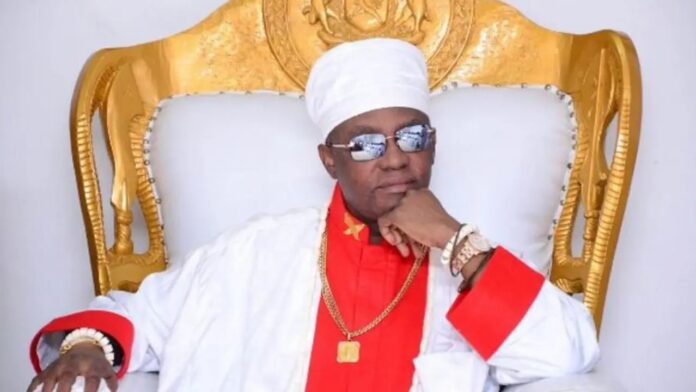A respected Christian cleric, Bishop Dr. Osaren Emokpae, has raised the alarm over what he describes as a looming crisis in the Benin Kingdom, following the suspension of several traditional rulers by the Benin Traditional Council (BTC).
Dr. Emokpae, who is the Presiding Bishop of Macedonia Call Global Assembly and a descendant of Ohon in the Benin Kingdom, called on the Oba of Benin, Oba Ewuare II, to immediately reverse the suspension of the Enogie of Ehor and 66 other Enigies.
In his message, Bishop Emokpae said the ongoing conflict, if not carefully addressed, could lead to serious unrest and further division in the historic kingdom. He appealed to the revered monarch to act swiftly to restore unity and peace.
According to the cleric, the decision by the Benin Palace to suspend the Enogies has already started stirring discontent among various communities under the kingdom. He cited the case of Igbanke community in Orhionmwon Local Government Area, which has openly rejected the Oba’s authority in the matter.
Dr. Emokpae said, “It is in the enlightened self-interest of the Oba of Benin to immediately reverse his current path. The Igbanke are already calling the bluff of the Benin monarch, while others are preparing to do so.”
He reminded the Oba that leadership should be about compassion, wisdom, and justice. “Life is like a vapour that can vanish anytime,” he said. “Let us be remembered for good and not for destruction.”
Quoting biblical scripture, he added, “It is God who appoints kings and removes them. He gives wisdom to the wise and knowledge to those who understand.”
The bishop prayed for Oba Ewuare II, wishing him good health and divine guidance during this challenging time.
The crisis escalated when leaders of Igbanke community released an open letter through the Igbanke Strategic Group, rejecting a directive from the Oba’s palace that their traditional ruler should step down and hand over to an Odionwere — a palace-appointed community head.
The letter, signed by Chief Jude Ugbekile and nine others, stated that the kingship in Igbanke is inherited from father to son and is not subject to appointment by the Oba of Benin.
“Our kings are born and inherit the kingship from our fathers. We reject handover kings,” the statement said.
The group also accused envoys from the Oba of sending disturbing letters to four of their traditional rulers, instructing them to step aside in favour of Odionweres appointed by the Benin Palace.
They described the action as an “affront to their identity” and a violation of their cultural heritage.
Two weeks ago, the Oba of Benin, through the Benin Traditional Council, suspended 67 Enigies (district heads) across the kingdom. The reasons for the suspension were not made fully public, but reports suggest it may be related to disputes over loyalty, traditional roles, and palace authority.
The move has sparked widespread debate and tension in Edo State, with some communities beginning to openly question the extent of the Oba’s authority, particularly in areas with their own long-standing traditions and ruling systems.
In their open letter, the Igbanke leaders appealed to the Edo State Governor, Mr. Monday Okpebholo, to intervene in the matter to prevent further division and to ensure justice in line with the United Nations’ Charter on Human Rights.
The group stressed the importance of preserving their traditional values, warning that external interference in their leadership structure could lead to the erosion of their cultural identity.
They stated that the Oba’s actions risk undermining peace and unity, not just in Igbanke, but across other communities that feel similarly excluded or disrespected.
The Benin Kingdom is one of Nigeria’s oldest and most respected traditional institutions, with centuries of history and influence. Oba Ewuare II, who ascended the throne in 2016, has worked to modernise the monarchy while maintaining its deep cultural roots.
However, this recent development has exposed cracks in the relationship between the palace and certain communities. Analysts believe the current crisis highlights the need for open dialogue and a balanced approach that respects local customs while preserving the kingdom’s unity.
There is growing concern that failure to manage the conflict could weaken the institution’s authority and damage the reputation of the monarchy, which has long served as a symbol of Edo pride and heritage.
Bishop Emokpae, in his passionate plea, said, “The Oba Ewuare II of Benin, who is my cousin, is loved by our family and our desire is that the little left of the Benin Kingdom would not collapse in his time.”
He appealed to the monarch to show leadership by example and be remembered as a peacemaker who united his people, not one who ruled with fear or exclusion.
The bishop urged all sides to remain calm and embrace peace, warning that the alternative could lead to deep divisions and lasting damage.
As pressure mounts, it remains to be seen whether the Oba of Benin will heed the calls for reconciliation and reverse the suspension of the Enigies. The palace has yet to release an official statement in response to the growing public outcry.
Meanwhile, all eyes are on the Edo State Government to mediate the dispute before it escalates beyond control.

